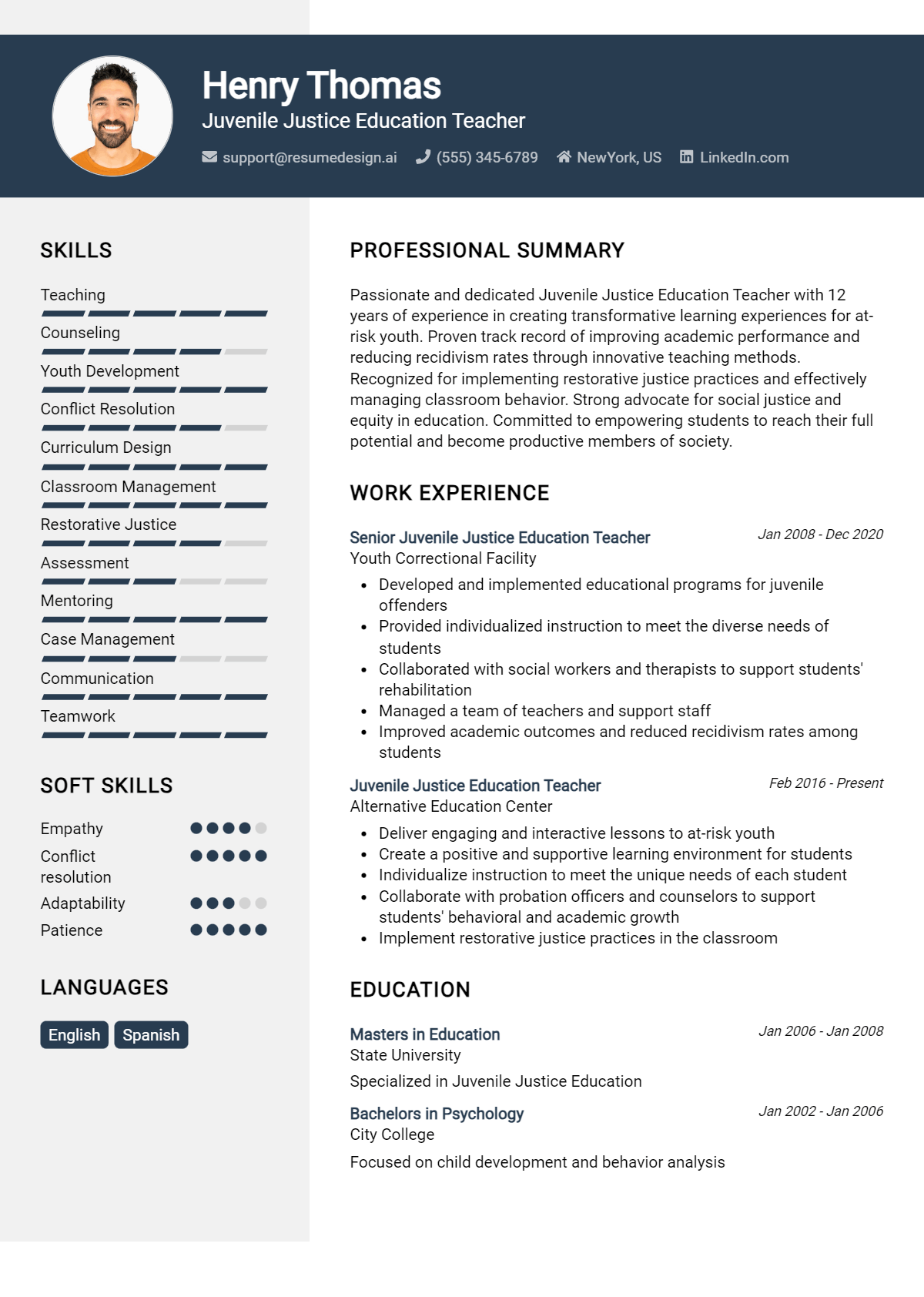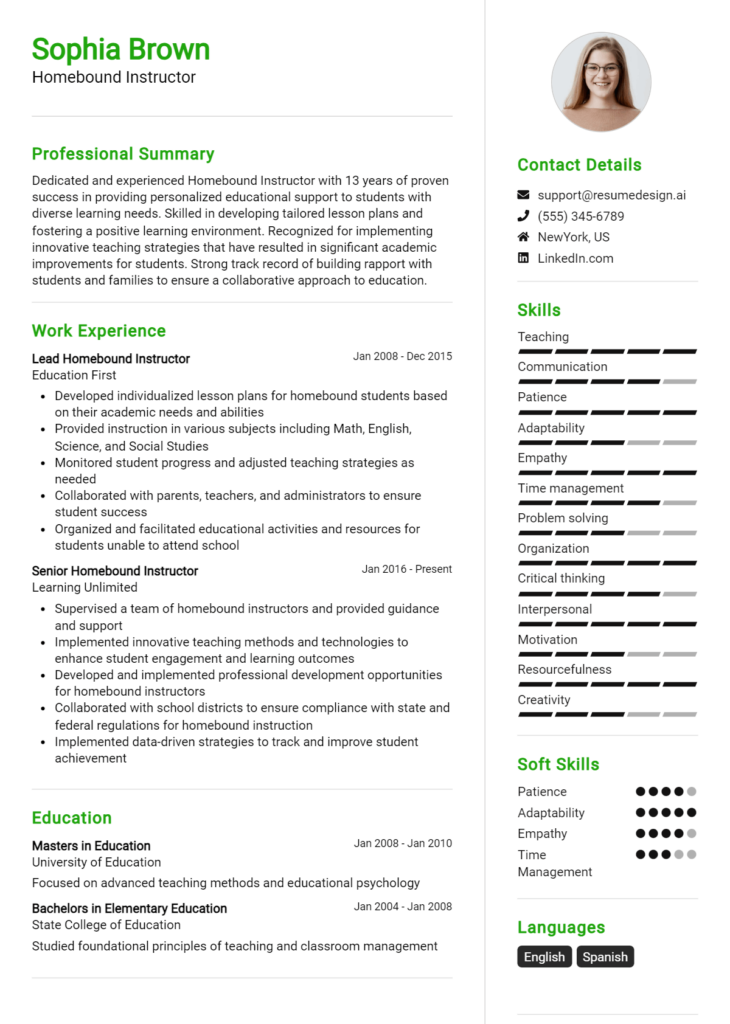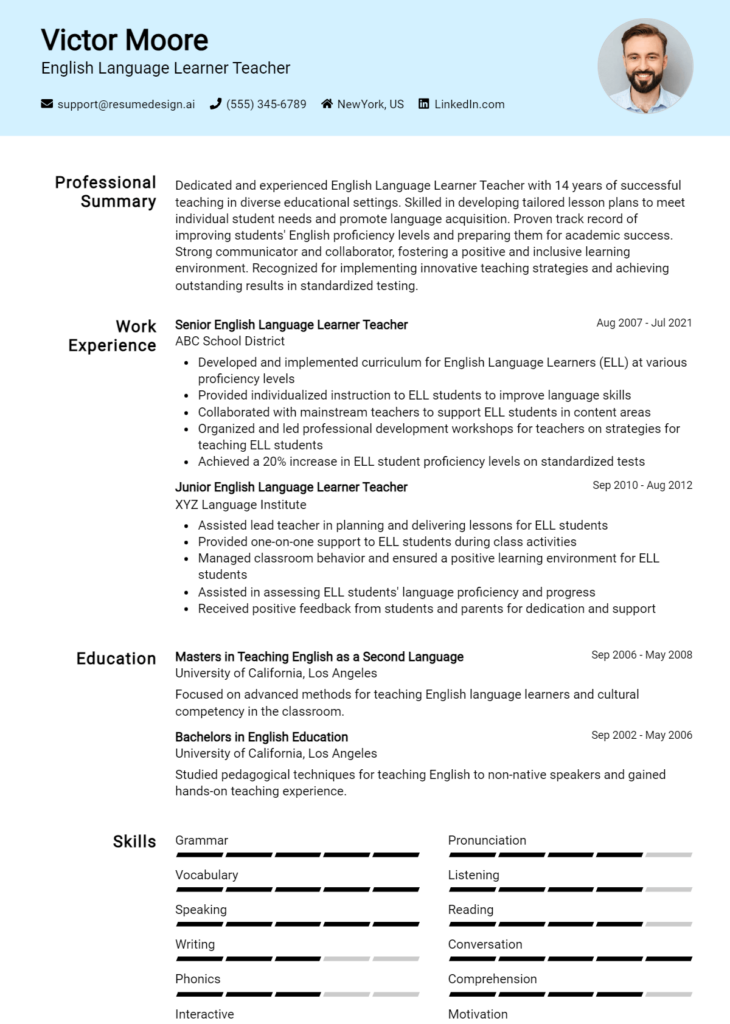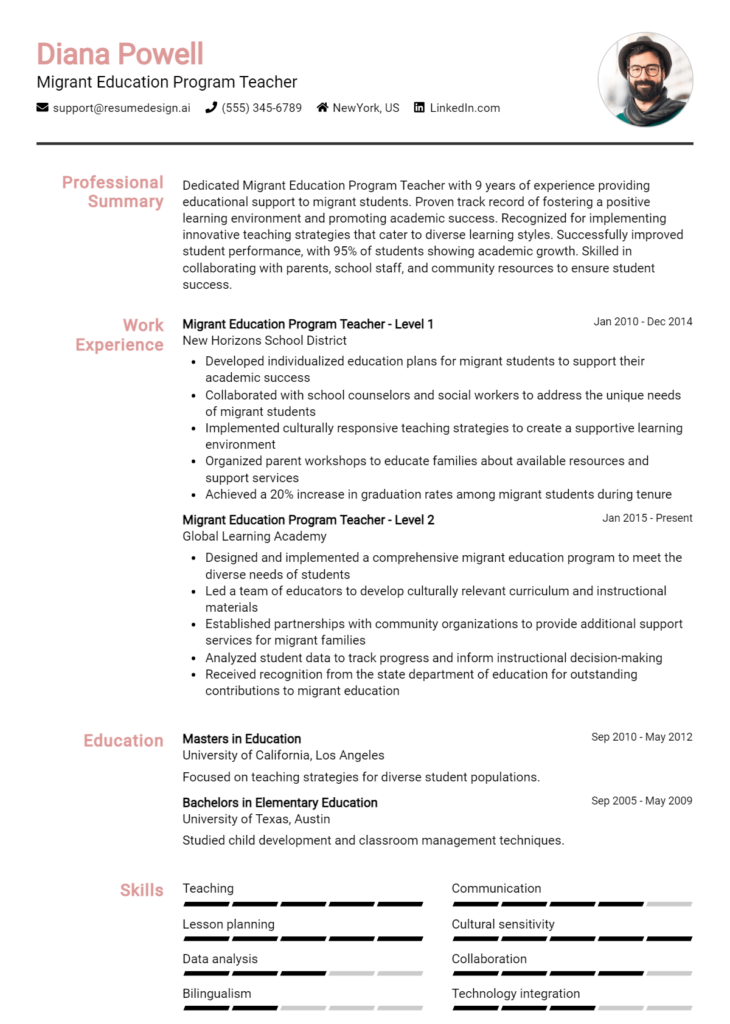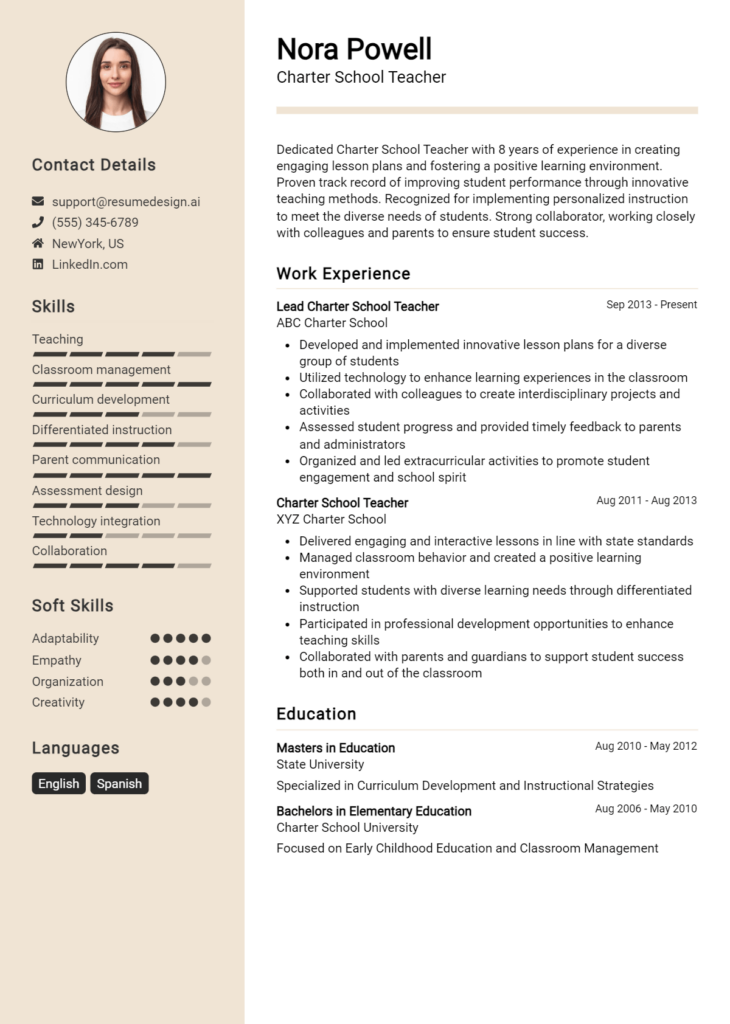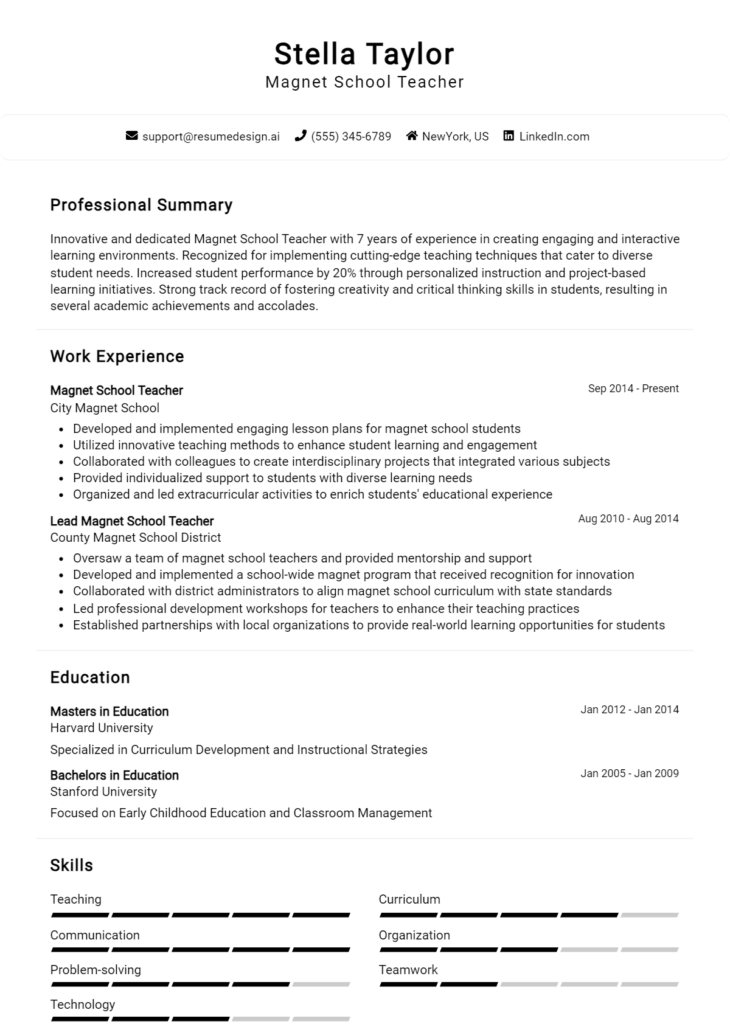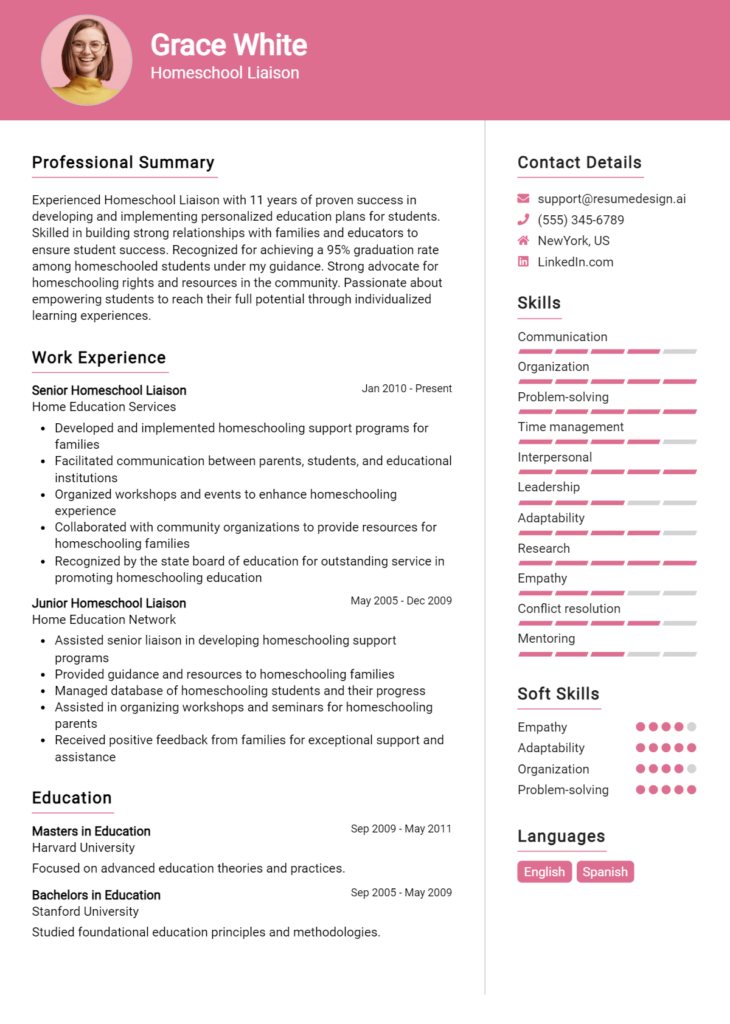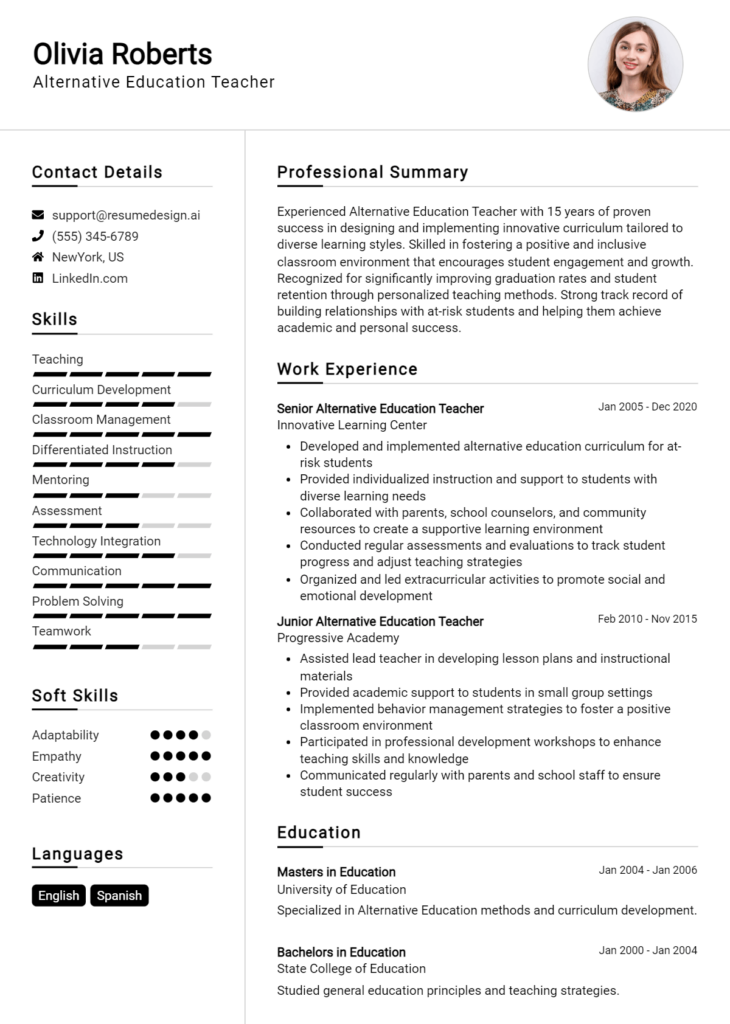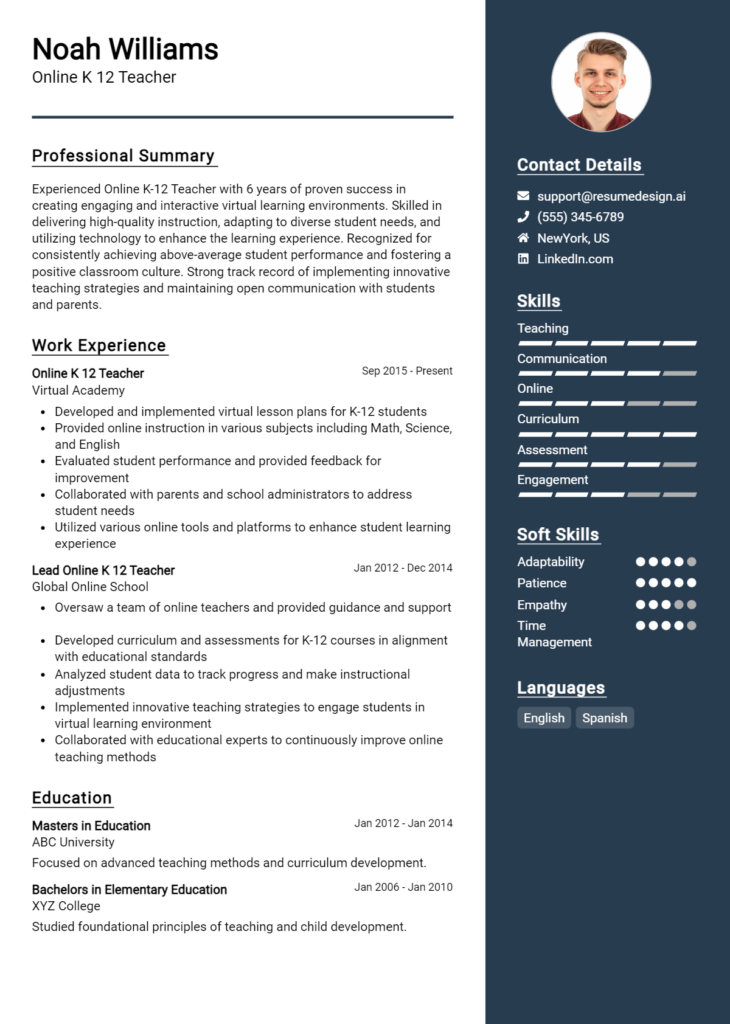Juvenile Justice Education Teacher Core Responsibilities
A Juvenile Justice Education Teacher plays a crucial role in bridging educational and correctional systems by providing tailored instruction to at-risk youth. Key responsibilities include developing individualized learning plans, collaborating with social workers and correctional staff, and implementing behavioral interventions. Essential skills encompass technical proficiency in educational technologies, operational planning, and strong problem-solving abilities to address diverse student needs. These competencies are vital in contributing to the organization's goals of rehabilitation and academic success, which can be effectively highlighted in a well-structured resume.
Common Responsibilities Listed on Juvenile Justice Education Teacher Resume
- Design and implement individualized education plans (IEPs) for students.
- Collaborate with multidisciplinary teams to support student development.
- Deliver engaging lessons that meet state educational standards.
- Monitor and assess student progress, adjusting teaching methods as needed.
- Provide counseling and mentorship to students facing personal challenges.
- Facilitate group activities to promote teamwork and social skills.
- Maintain accurate records of student performance and behavior.
- Develop and adapt curriculum materials to meet diverse learning needs.
- Conduct workshops for staff on effective teaching strategies for at-risk youth.
- Engage with families and guardians to foster a supportive learning environment.
- Participate in training and professional development opportunities.
- Advocate for student needs within the juvenile justice system.
High-Level Resume Tips for Juvenile Justice Education Teacher Professionals
In the competitive field of juvenile justice education, a well-crafted resume is crucial for professionals looking to make a meaningful impact. Often, the resume serves as the first impression a candidate makes on a potential employer, making it essential that it effectively reflects both skills and achievements relevant to the role. A strong resume not only showcases your qualifications but also communicates your passion for educating and rehabilitating youth within the justice system. This guide will provide practical and actionable resume tips specifically tailored for Juvenile Justice Education Teacher professionals, helping you stand out in a meaningful way.
Top Resume Tips for Juvenile Justice Education Teacher Professionals
- Tailor your resume to the job description by incorporating keywords and phrases from the posting.
- Highlight relevant teaching experience, especially in alternative education settings or with at-risk youth.
- Quantify your achievements, such as the number of students improved academically or behaviorally under your guidance.
- Showcase any specialized training or certifications related to juvenile justice and education.
- Include specific examples of lesson plans or programs you developed that catered to the unique needs of juvenile populations.
- Demonstrate your ability to collaborate with law enforcement and social services in rehabilitative efforts.
- Emphasize your understanding of the legal and ethical considerations involved in juvenile education.
- Utilize a clean and professional format that makes your resume easy to read and visually appealing.
- Incorporate testimonials or feedback from previous employers or colleagues that highlight your impact.
- Keep your resume focused and concise, ideally no longer than one page, ensuring that every detail adds value.
By implementing these tips, you can significantly increase your chances of landing a job in the Juvenile Justice Education Teacher field. A thoughtfully constructed resume will not only convey your qualifications but also reflect your dedication to making a positive difference in the lives of youth in the justice system.
Why Resume Headlines & Titles are Important for Juvenile Justice Education Teacher
In the competitive field of juvenile justice education, a well-crafted resume headline or title serves as a crucial first impression for potential employers. These brief phrases can grab the attention of hiring managers, providing a snapshot of a candidate's key qualifications and suitability for the role. A strong headline encapsulates relevant skills and experiences in a concise manner, allowing hiring managers to quickly assess the candidate's fit for the position. By directly relating to the job being applied for, a compelling headline not only enhances visibility but also sets the tone for the entire resume, making it an essential component for aspiring juvenile justice education teachers.
Best Practices for Crafting Resume Headlines for Juvenile Justice Education Teacher
- Keep it concise: Aim for one impactful phrase that summarizes your qualifications.
- Be role-specific: Tailor your headline to reflect the specific position of Juvenile Justice Education Teacher.
- Highlight key strengths: Focus on your most relevant skills or accomplishments that align with the job description.
- Use action-oriented language: Begin with strong verbs that convey your capabilities and achievements.
- Avoid jargon: Use clear and straightforward language that is easily understood by hiring managers.
- Incorporate keywords: Include relevant keywords from the job description to improve visibility in applicant tracking systems.
- Showcase your impact: If possible, include quantifiable accomplishments to demonstrate your effectiveness.
- Revise and refine: Continuously update your headline to reflect your evolving skills and experiences.
Example Resume Headlines for Juvenile Justice Education Teacher
Strong Resume Headlines
Dedicated Juvenile Justice Education Teacher with 5+ Years of Experience in Behavioral Intervention Strategies
Innovative Educator Specializing in Trauma-Informed Practices for At-Risk Youth
Passionate Advocate for Youth Development and Restorative Justice in Educational Settings
Results-Driven Teacher Committed to Enhancing Educational Outcomes for Juvenile Offenders
Weak Resume Headlines
Teacher Looking for a Job
Education Professional with Experience
Juvenile Justice Educator
The strong headlines listed above are effective because they are specific, impactful, and directly related to the role of a Juvenile Justice Education Teacher. They highlight relevant experience, skills, and a clear commitment to the field, making the candidate stand out. In contrast, the weak headlines fail to impress as they are overly generic and lack detail. Such headlines do not offer any insight into the candidate's qualifications or unique value, making it difficult for hiring managers to see why they should consider these applicants for the role.
Work Experience Section for Juvenile Justice Education Teacher Resume
The work experience section of a Juvenile Justice Education Teacher resume is crucial as it serves as a comprehensive showcase of the candidate's technical skills, teamwork capabilities, and ability to deliver high-quality educational outcomes in a challenging environment. It is essential for candidates to highlight their relevant experiences in a manner that aligns with industry standards, demonstrating their effectiveness in managing diverse groups of students and implementing educational programs tailored to the needs of juvenile populations. Quantifying achievements is vital, as it provides concrete evidence of the candidate's impact and success in previous roles, making them a compelling choice for potential employers.
Best Practices for Juvenile Justice Education Teacher Work Experience
- Highlight specific technical skills related to educational methodologies and juvenile rehabilitation.
- Quantify achievements using metrics, such as improved test scores or reduced recidivism rates.
- Emphasize collaborative efforts with multidisciplinary teams, including therapists, social workers, and law enforcement.
- Demonstrate adaptability by providing examples of modifying curricula for diverse learning needs.
- Showcase leadership roles taken on during educational initiatives or community outreach programs.
- Include relevant certifications or training that enhance professional qualifications in juvenile justice education.
- Utilize action verbs to convey a sense of proactivity and engagement in the role.
- Align experiences with key competencies sought by employers in the juvenile justice field.
Example Work Experiences for Juvenile Justice Education Teacher
Strong Experiences
- Developed and implemented an innovative curriculum that improved student literacy rates by 30% over one academic year.
- Led a team of educators and counselors in a program that reduced behavioral incidents by 40%, fostering a more conducive learning environment.
- Collaborated with community organizations to create a mentorship program that matched 50 at-risk youth with successful adult mentors, leading to a 25% decrease in recidivism.
- Trained and mentored new teachers on effective classroom management techniques, resulting in a 15% increase in overall student engagement metrics.
Weak Experiences
- Taught various subjects to juveniles without providing details on curriculum or outcomes.
- Assisted in some projects within the educational setting, but no specifics on the contributions or results were mentioned.
- Engaged with students in the classroom, but the description lacks information on methods or achievements.
- Helped with planning educational activities but did not quantify any success or impact from those activities.
The examples provided are considered strong because they highlight specific, quantifiable achievements that demonstrate the candidate's effectiveness in their role. Each point clearly articulates the impact of their work, showcasing technical leadership and collaboration with other professionals. In contrast, the weak experiences lack detail and measurable outcomes, making them less impactful and failing to convey the candidate's true contributions to the educational environment. This distinction is critical in presenting a compelling case to potential employers in the field of juvenile justice education.
Education and Certifications Section for Juvenile Justice Education Teacher Resume
The education and certifications section of a Juvenile Justice Education Teacher resume is crucial in establishing the candidate's academic qualifications and professional expertise. This section not only showcases the candidate's educational background but also highlights industry-relevant certifications and commitment to continuous learning. By providing details on relevant coursework, specialized training, and certifications, applicants can greatly enhance their credibility and demonstrate their alignment with the specific demands of the job role in juvenile justice education.
Best Practices for Juvenile Justice Education Teacher Education and Certifications
- Include degrees that are directly relevant to education, psychology, or juvenile justice.
- List certifications from recognized institutions that pertain to teaching, counseling, or juvenile justice.
- Highlight any specialized training in behavioral management or trauma-informed teaching practices.
- Provide details of relevant coursework that aligns with juvenile justice and education methodologies.
- Ensure all credentials are current, emphasizing ongoing professional development.
- Use clear and concise language to describe qualifications, focusing on achievements and skills gained.
- Consider including honors or recognitions that underscore expertise in the field.
- Tailor the education and certifications section to the specific job description to enhance relevance.
Example Education and Certifications for Juvenile Justice Education Teacher
Strong Examples
- M.A. in Education with a focus on Special Education, University of XYZ, 2021
- Certified Teacher in Special Education, State Board of Education, 2022
- Trauma-Informed Care Training, National Institute for Trauma and Loss in Children, 2023
- B.A. in Psychology, Minor in Criminal Justice, University of ABC, 2019
Weak Examples
- High School Diploma, Anytown High School, 2010
- Certification in Basic First Aid, American Red Cross, 2019
- Online Course in General Teaching Strategies, 2020
- Associate Degree in Business Administration, Community College, 2018
The strong examples are considered effective because they demonstrate relevant and specialized education that directly pertains to the role of a Juvenile Justice Education Teacher. They include advanced degrees and certifications that highlight the candidate's readiness to work in the field. In contrast, the weak examples lack direct relevance to juvenile justice education and do not reflect the ongoing professional development necessary for this specific teaching role. They may indicate a lack of focus on the necessary skills and knowledge required in the field.
Top Skills & Keywords for Juvenile Justice Education Teacher Resume
In the field of juvenile justice education, a well-crafted resume can significantly impact a candidate's chances of securing a position. The importance of showcasing relevant skills cannot be overstated, as they demonstrate a teacher's ability to connect with at-risk youth and navigate the complexities of the juvenile justice system. Employers look for a combination of both soft and hard skills that highlight a candidate's teaching prowess, adaptability, and understanding of the unique challenges faced by their students. By strategically incorporating these skills into a resume, educators can effectively present their qualifications and readiness to make a positive impact in the lives of young people in the juvenile justice system.
Top Hard & Soft Skills for Juvenile Justice Education Teacher
Soft Skills
- Empathy
- Active Listening
- Conflict Resolution
- Patience
- Adaptability
- Communication Skills
- Teamwork
- Cultural Competence
- Problem-Solving
- Mentoring
Hard Skills
- Knowledge of Special Education Laws
- Curriculum Development
- Classroom Management
- Individualized Education Plans (IEPs)
- Assessment and Evaluation Techniques
- Crisis Intervention Strategies
- Familiarity with Juvenile Justice Policies
- Educational Technology Proficiency
- Behavior Modification Techniques
- Trauma-Informed Teaching Practices
In crafting a compelling resume, it is essential to emphasize both skills and relevant work experience that align with the expectations of the juvenile justice education sector. This approach not only enhances the resume’s impact but also increases the likelihood of standing out in a competitive job market.
Stand Out with a Winning Juvenile Justice Education Teacher Cover Letter
Dear Hiring Manager,
I am writing to express my interest in the Juvenile Justice Education Teacher position at [School/Organization Name], as advertised on [Job Board/Website]. With a strong background in education and a heartfelt commitment to supporting at-risk youth, I believe I am well-equipped to create a positive and impactful learning environment for students in the juvenile justice system. My experience in both classroom settings and therapeutic programs has equipped me with the skills to engage students who often face significant challenges, and I am passionate about helping them succeed academically and personally.
In my previous role as an educator at [Previous School/Organization], I developed and implemented individualized lesson plans that catered to the diverse learning needs of my students. I utilized innovative teaching methods, such as project-based learning and experiential activities, to foster critical thinking and problem-solving skills. My approach not only emphasized academic performance but also focused on building social-emotional competencies, which are crucial for students in the juvenile justice system. By establishing trusting relationships and creating a supportive atmosphere, I was able to inspire my students to take ownership of their education and work toward their goals.
Furthermore, my collaboration with mental health professionals and social workers has enriched my understanding of the unique challenges facing youth in the juvenile justice system. Participating in multidisciplinary teams has allowed me to integrate trauma-informed practices into my teaching, cultivating a safe and inclusive environment for all students. I am committed to empowering these young individuals, helping them develop resilience and a sense of purpose as they navigate their educational journey and work toward rehabilitation.
I am excited about the opportunity to contribute to [School/Organization Name] and am eager to bring my expertise in education and my passion for supporting at-risk youth to your team. Thank you for considering my application. I look forward to the possibility of discussing how my experience and vision align with the goals of your program.
Sincerely,
[Your Name]
[Your Contact Information]
Common Mistakes to Avoid in a Juvenile Justice Education Teacher Resume
When crafting a resume for a position as a Juvenile Justice Education Teacher, it is crucial to present yourself in the best possible light. However, many candidates make common mistakes that can diminish their chances of being noticed by hiring managers. By avoiding these pitfalls, you can create a more compelling resume that showcases your qualifications and commitment to working with at-risk youth.
Neglecting to Tailor the Resume: One of the biggest mistakes is using a generic resume. Tailoring your resume to the specific job description and highlighting relevant skills and experiences can significantly enhance your appeal.
Overloading with Jargon: While it’s important to demonstrate your knowledge of juvenile justice and education, using overly technical language can confuse the reader. Aim for clarity and accessibility in your descriptions.
Omitting Relevant Experience: Some candidates fail to include pertinent volunteer work or internships that relate to juvenile justice education. Every experience that showcases your ability to work with youth or in educational settings should be included.
Underestimating Soft Skills: In the field of juvenile justice education, soft skills like empathy, patience, and communication are essential. Failing to highlight these skills can ignore a critical aspect of your qualifications.
Ignoring Format and Readability: A cluttered or poorly formatted resume can detract from your content. Ensure your resume is organized, with clear headings and bullet points that guide the reader through your qualifications.
Listing Responsibilities Instead of Achievements: Many applicants focus on their job duties instead of their accomplishments. Emphasizing what you achieved in previous roles can make a stronger impact.
Using Passive Language: Passive language can make your resume sound weak. Use active verbs to convey your contributions and assert your role in previous positions.
Failing to Proofread: Spelling and grammatical errors can make a negative impression. Always proofread your resume multiple times and consider having someone else review it for errors you might have missed.
Conclusion
In summary, the role of a Juvenile Justice Education Teacher is crucial in shaping the lives of young individuals within the justice system. These educators not only provide academic instruction but also serve as mentors, helping students navigate their unique challenges and fostering a supportive learning environment. Key elements of this position include designing tailored curricula, collaborating with social workers and counselors, and promoting positive behavioral changes among students.
As you reflect on your qualifications and experiences in this important field, it's essential to ensure your resume effectively communicates your skills and adaptability. Take this opportunity to review and enhance your Juvenile Justice Education Teacher Resume. To aid in this process, consider utilizing available resources such as resume templates, which can provide a professional layout; resume builder, offering an intuitive way to create a standout resume; resume examples, showcasing successful formats and content; and cover letter templates, to complement your application. Start refining your resume today to make a lasting impact in the field of juvenile justice education!

